We not only offer delicious food, but also aim to reduce food waste and support farmers by practicing CSV through products based on the collective impact approach.
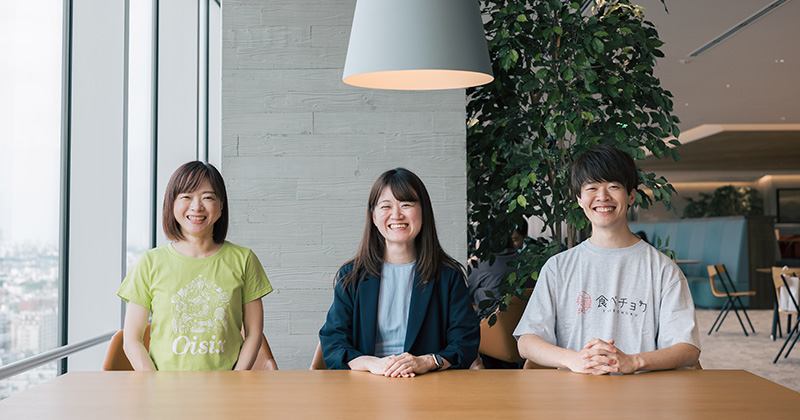
In Japan, approximately 5.23 million tons of food that is still edible are discarded annually *1. Discarded food is transported to landfills, where transportation and incineration emit CO2. Additionally, products that do not meet specifications and are difficult to distribute in general circulation are also discarded, which increases the producers' operating cost. Food loss is an urgent issue society faces in various ways.
To address these social issues, Kirin launched the Hyoketsu® Mottainai Project in May 2024 as part of its CSV management practices through products. This initiative uses non-conforming fruits as raw materials for the long-selling brand Hyoketsu®, contributing to reducing food loss and other social issues and supporting sustainable cultivation practices for fruit farmers.
With food loss becoming a serious issue in Japan and worldwide, how should companies address the challenges faced by producers and primary industries that support the value chain?
Yusuke Matsuura of Tabe Choku, an online direct sales platform that connects producers directly with customers, Sonoko Tokairin, founder of the food waste solution brand Upcycle by Oisix (Oisix Ra Daichi Co., Ltd.), and Kana Yamaoka, who was involved in the product development of 'Hyoketsu® Mottainai, engaged in a candid discussion about the current state of food waste and the future role of companies.
*1 Estimates for fiscal year 2021 (Ministry of Agriculture, Forestry and Fisheries, Ministry of the Environment)
Food loss is an unavoidable social issue in the food sector
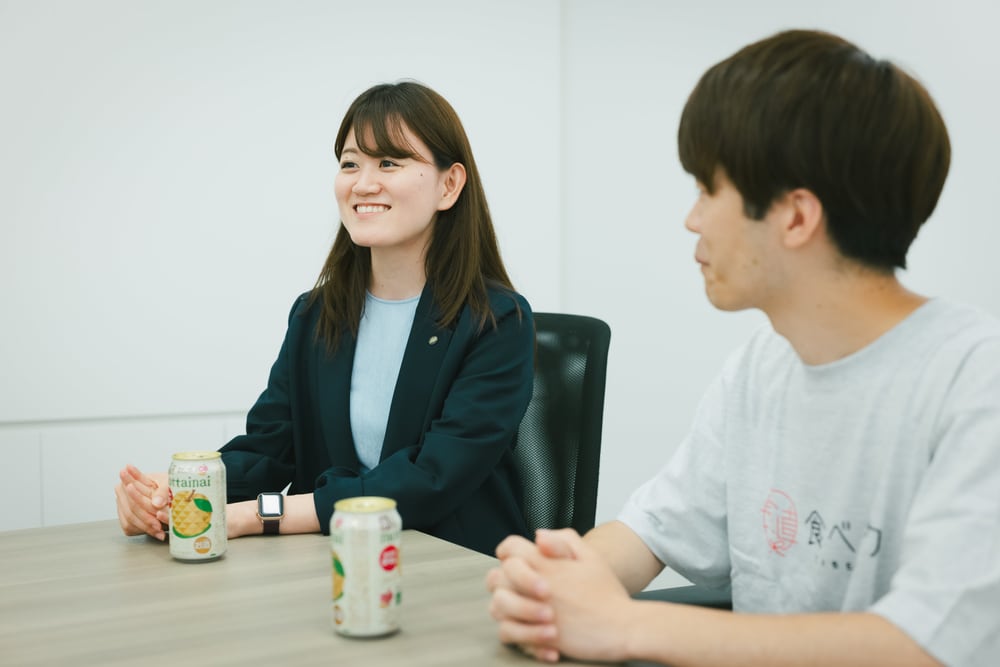
Yamaoka: On May 7, 2024, Kirin Beer released Hyoketsu® Mottainai Hamanashi. This canned cocktail uses non-conforming raw material sourced from Hamanashi, a specialty of Yokohama City, Kanagawa Prefecture. In addition, 1 yen from each can sold will be donated to support agriculture.
Food loss is a significant social issue in the food sector, but this project also addresses various challenges surrounding agriculture. We reached out to both companies to hear their perspectives on how they are tackling these issues and creating economic value.
Matsuura: Thank you. Vivid Garden operates an online shopping site called Tabe Choku, where customers can directly order produce from farmers nationwide. Our company was founded with the vision of “creating a world where producers' dedication is properly recognized.” We aim to build a world where even small-scale producers can be rewarded for their efforts, acknowledged for their dedication, and able to earn a fair income. In pursuing this philosophy, food loss is an issue we cannot ignore.
Tokairin: Oisix Ra Daichi’s corporate philosophy is to achieve sustainable food consumption through a concept “the dining table of the future, the farm of the future.” We are committed to addressing social issues related to food through our business and tackling food waste issue.
Particularly in Japan, vegetables and fruits are highly valued for their appearance and uniformity. As a result, producers are reluctant to sell produce that do not meet these standards. The reason is simple: they are not profitable.
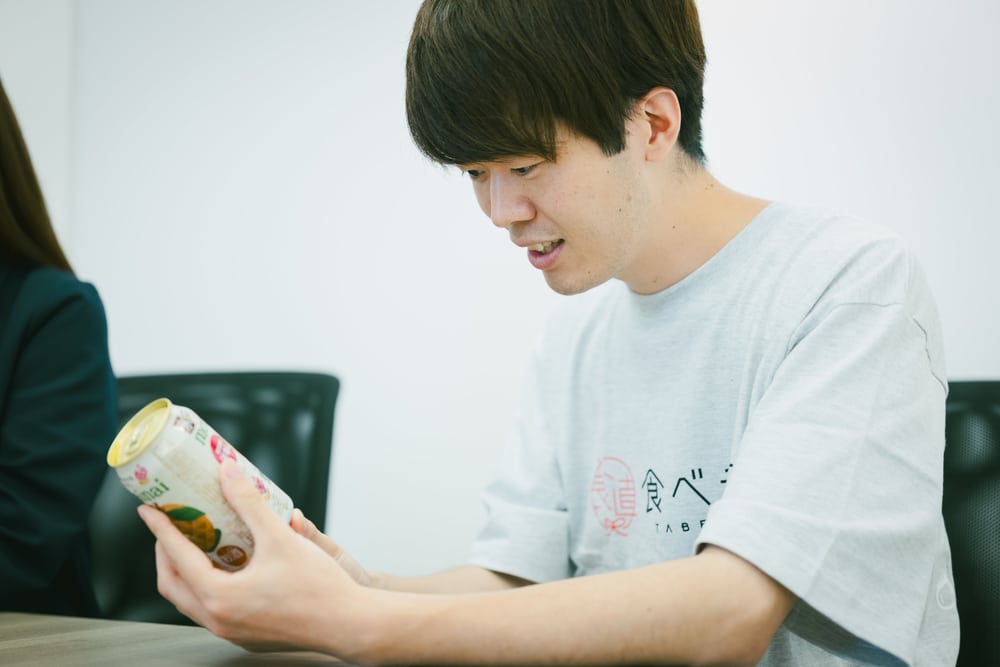
Matsuura: That's right. That's why I was honestly shocked to hear about Hyoketsu® Mottainai Hamanashi. From the producers' perspective, selling regular produce at the right price is the priority, so they are not actively trading non-conforming produce. Kirin, a major beverage manufacturer, has entered this area. I think this is amazing.
Tokairin: There's also the issue of lot sizes *2. We launched the Upcycle by Oisix brand as part of our efforts to reduce food waste. This initiative aims to add value to previously discarded ingredients due to appearance or texture issues. We're transforming ingredients once deemed unfit for consumption into new food products. In essence, it's food upcycling.
Since launching Upcycle by Oisix three years ago, we have developed over 108 products. Since irregularly shaped produce make managing lot size challenging, it is difficult to sell such produce in large quantities continuously. That's why we focus on developing many food products in short cycles. I'm very curious about how Kirin, whose main focus is mass-market products, handles this aspect.
*2: The smallest unit of production and shipment for produce made under the same conditions.
“Hyoketsu® Mottainai Hamanashi reduced waste by approximately 22,000 units*3.
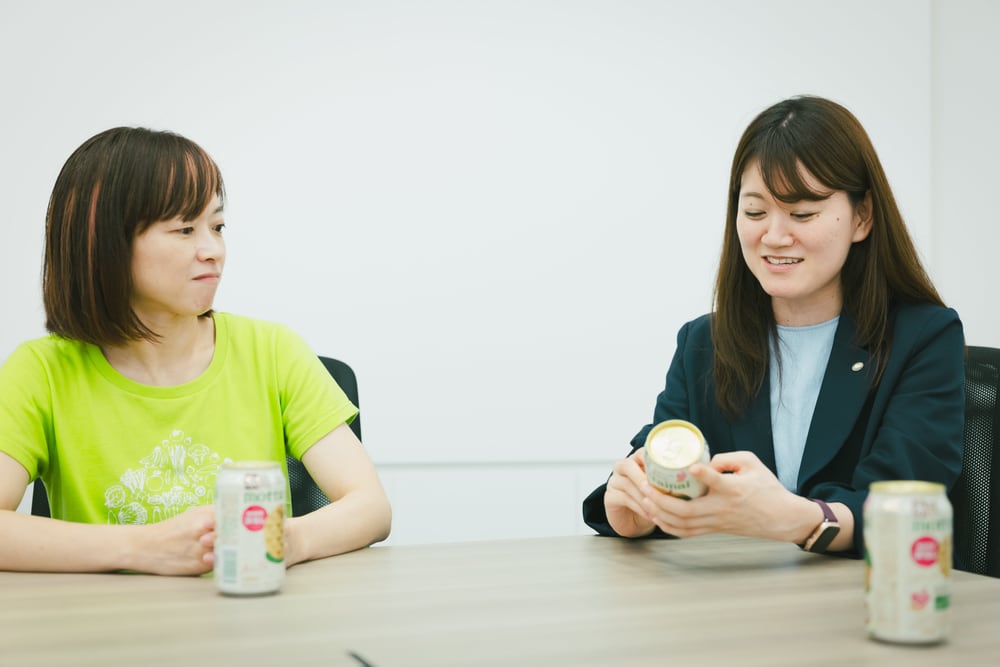
Yamaoka: As you said, we were confused at first. The procurement period was different from conventional products, and there were fluctuations in the shipment volume. Stable supply is the manufacturer's responsibility, so product development was complex due to the uncertainty of supply volumes.
However, this initiative may relate to the new value Mr. Tokairin mentioned. Hyoketsu® Mottainai Hamanashi specializes in using non-standard products, which is a new challenge for us. As such, the sales and logistics departments have also changed their approach.
Fluctuations in shipments may cause inconvenience to suppliers, retailers, and customers. However, we received positive cooperation from within the company based on a shared understanding that selling Hyoketsu® Mottainai Hamanashi contributes to solving the social issue of food loss, leading to the product’s commercialization. At the time of its launch, we heard many sales representatives say, “I am proud to sell this product.”
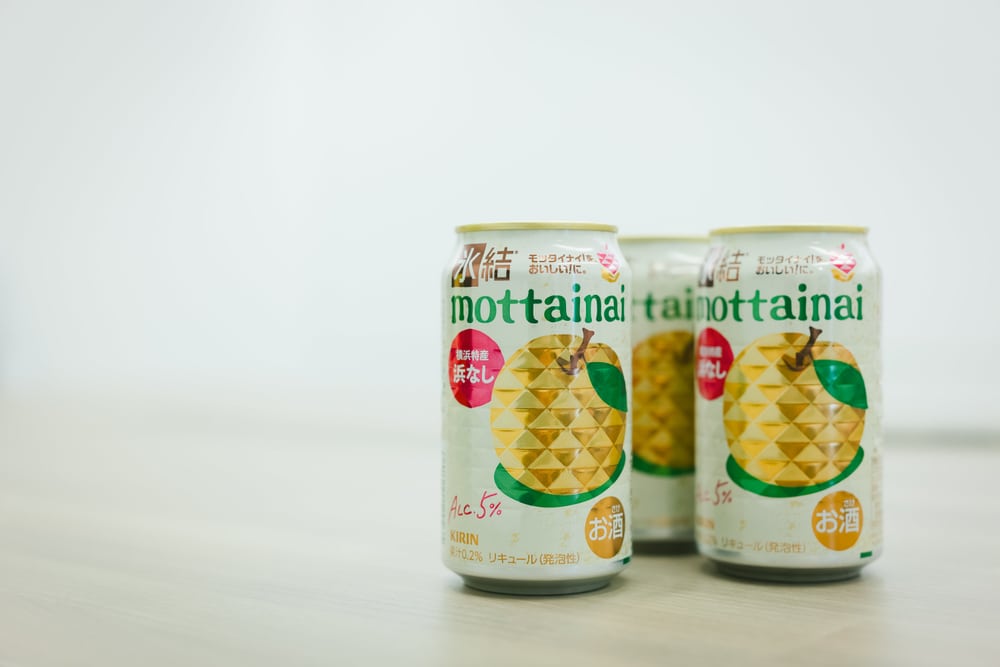
Yamaoka: I think it's because everyone in the supply chain shared this new value. The initial goal for “Hyoketsu® Mottainai Hamanashi” was to save 22,000*3 Hamanashi, but we achieved that goal about a week after the launch.
Matsuura: I think 22,000 means more than just a number. The Tabe Choku service we operate is online, which requires customers to visit the site. On the other hand, the fact that a product contributing to food loss reduction was launched under the established Hyoketsu® brand means that the product will be available at supermarkets and convenience stores that customers visit regularly. In other words, the connections between customers and the product are easily created.
*3: Estimated fruit content calculated based on the amount of fruit juice used in the product
Your choice of a delicious alcoholic beverage can contribute to solving social issues.
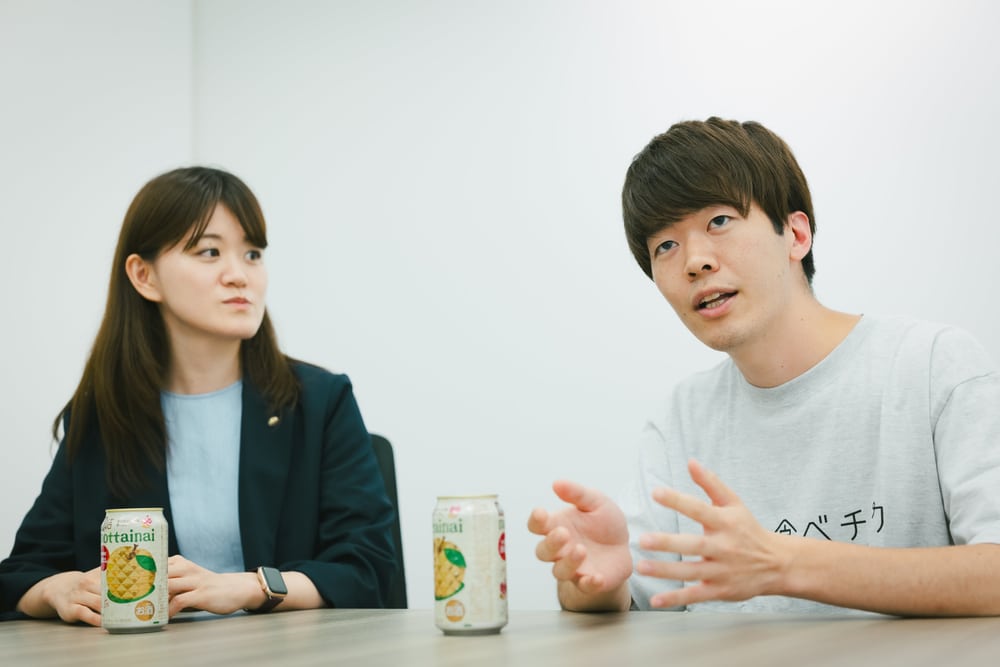
Matsuura: I believe that people drink alcohol because it tastes good or because they want to have a good time. By choosing a product like Hyoketsu® Mottainai Hamanashi from the shelves of supermarkets or convenience stores because it tastes good, customers can indirectly engage with social issues. I believe that the more options consumers have when choosing alcohol, the better environmentally.
Yamaoka: Increasing the alcoholic beverage options for consumers was also something we wanted to challenge through Hyoketsu® Mottainai Hamanashi. The Kirin Group aims to realize CSV (Creating Shared Value/creating value shared with customers and society) and has established four purposes.
As Kirin Beer, we want to fulfill two of those purposes in particular: fulfilling our responsibility as an alcoholic beverage manufacturer and contributing to realizing e a heartful society that is the goal of our “community purpose.” We believe this is the positive effect of alcohol that our products have on connecting people , and it is also the raison d'être of our business.
It is a fact that if proper drinking habits are not maintained, alcohol can harm people's health. On the other hand, as Mr. Matsuura mentioned, alcohol also connects people, creates enjoyable moments, and contributes to a heartful lifestyle. We want to pass on a rich culture of alcoholic drinks to the next generation.
Hyoketsu® has used about 100 types of fruit in its products to date. It would not be an exaggeration to say that the brand has grown thanks to delicious fruit. When considering developing the brand while addressing social issues in the community and the environment, we wanted to create a project that would contribute to fruit farmers and production areas.
As we proceeded with product development, we gained a new understanding of the various issues in agriculture. Among these, food waste stands out as a pressing social issue in the food sector. In an era where young people are increasingly distancing themselves from alcohol, we hope this product, which addresses the social issues faced by fruit farmers and local communities that are crucial raw material sources for Hyoketsu®, will become a new point of connection between customers and alcohol.
The value of a sustainable product encourages consumers to keep purchasing it.
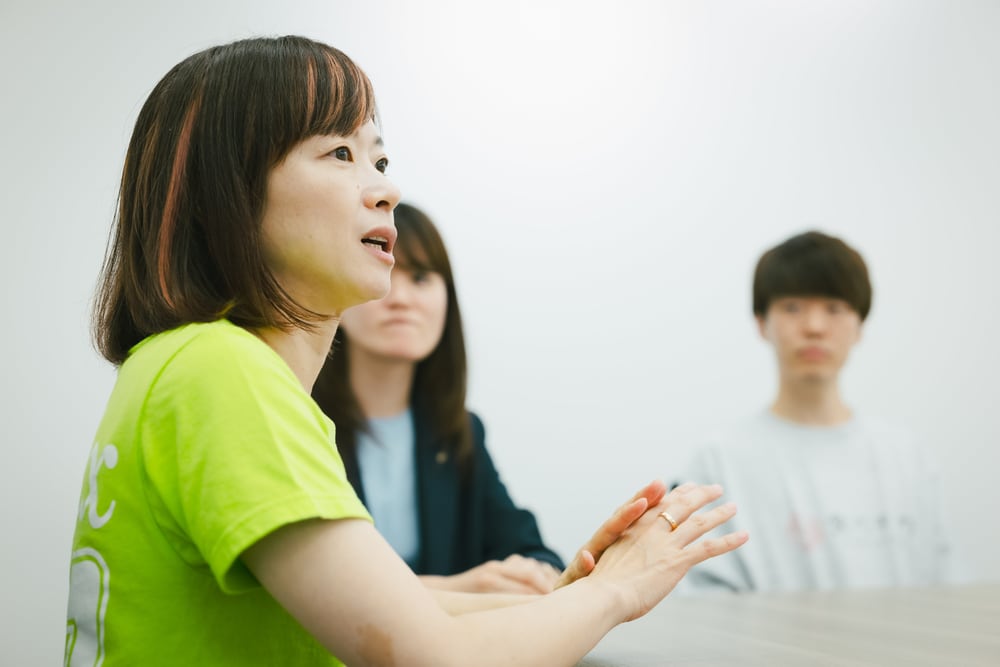
Matsuura: Caring for people's health while communicating the positive aspects of alcohol. That is precisely what Kirin aims for: solving social issues while creating economic value. Even when it comes to reducing food loss, simply selling products at a lower price to avoid waste is not enough. If we focus too much on solving issues, neither producers nor companies will survive.
If we don't approach this from business and social issue perspectives, the efforts and dedication of producers will not be valued appropriately, and the issue of improper compensation for producers will not be resolved.
Tokairin: Mr. Matsuura, the same applies to customers, doesn't it? Just as producers have lives to protect, customers also have their own lives. They are busy with work and family, and don't have time to shop or cook sometimes. At Oisix, we sell meal kits for such people who value convenience and taste most. Without those basics, they won't choose our products.
Does that mean companies aiming to reduce food waste are engaging in altruistic activities that disregard profits? No, that's not the case. While sustainable initiatives like reducing food waste may not be a reason to buy a product, they can be a reason to keep buying it.
Something prompts people to improve their diets. However, stop buying products that contribute to reducing food waste, as it makes them feel unsettling. Sustainable initiatives may have a gradual, cumulative effect, ultimately leading to an increase in LTV (Lifetime Value: customer lifetime value).
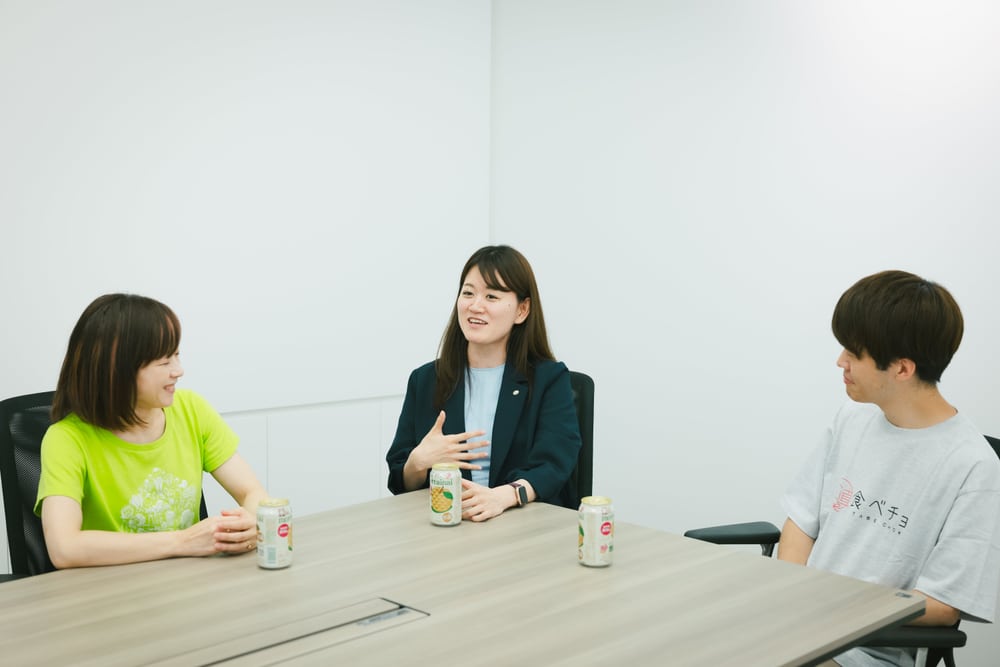
Yamaoka: I agree. Hyoketsu® Mottainai Hamanashi is an attempt to expand the options and enhance the value of alcohol, but taste is still the top priority. That's why I chose Yokohama's specialty, Hamanashi, as the main ingredient for this product—because I wanted to focus on taste.
While reducing food waste is an added value, we discovered an interesting finding from prior user surveys. Comparing responses before and after learning that this product contributes to reducing food waste, we observed that people found it tastier after.
Matsuura: The survey results clearly show that the added value of social contribution enhances customer satisfaction. This makes it easier to increase repeat customers, and as the product sells, food waste is reduced. Sustainable initiatives are now widely accepted in society, so customers likely feel better about choosing products that are good for society and the environment.
Tokairin: That sense of awareness will continue to grow in the future. For today's children and young people, sustainability awareness is a given. With SDGs incorporated into school curricula, they naturally understand the importance.
Opening up a sustainable future through collaboration and continuity
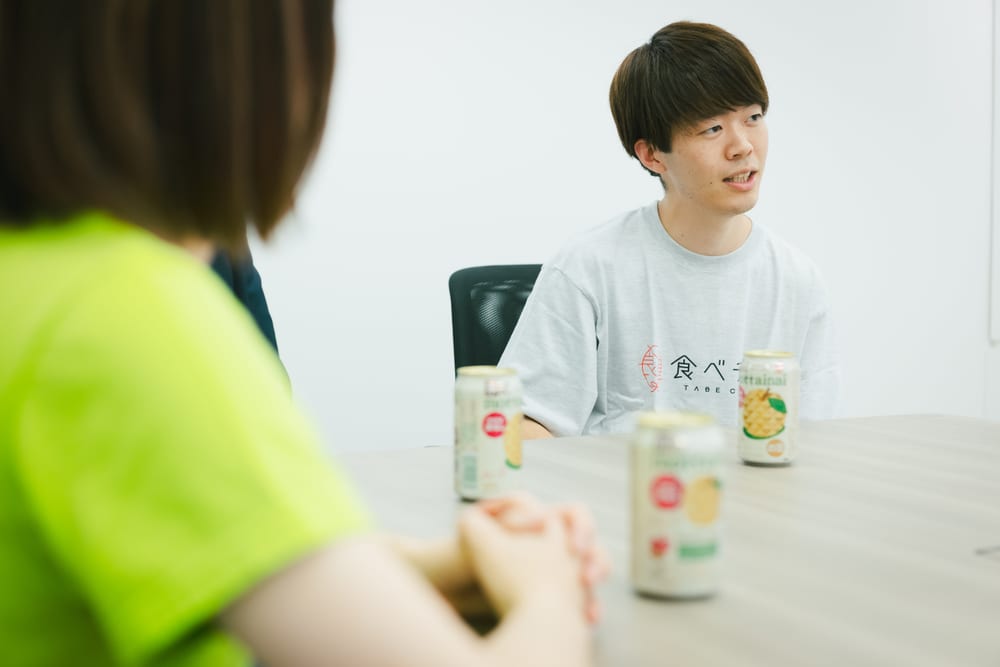
Matsuura: The concept of “Mottainai,” SDGs, and ethical consumption are becoming more common in our lives, and change is definitely happening. However, compared to Western countries, I honestly feel that Japan is still lagging. For example, in the fisheries industry, some standards result in the disposal of unwanted fish due to their poor appearance or low catch volume. Compared to agricultural products, these are not well known, but recently, there has been an increase in the number of users of Tabe Choku who search for unwanted fish. While awareness is indeed growing, actual orders for such products are still far from ideal, and there are hurdles for consumers to overcome before they decide to purchase.
Tokairin: It's a challenging issue. Even with our Upcycle by Oisix initiative, non-conforming products are more costly than standard ingredients available in general circulation, which is a significant drawback. Prices naturally rise, making them less accessible to customers.
Yamaoka: The same applies to Hyoketsu® Mottainai Hamanashi. This product costs a few yen more than the standard Hyoketsu® brand items. However, we aim for a price point that makes it accessible to customers. This was one of the challenges we faced during development. We must strive for appropriate pricing not only for the producers but also for the customers and to address social issues while growing as a company.
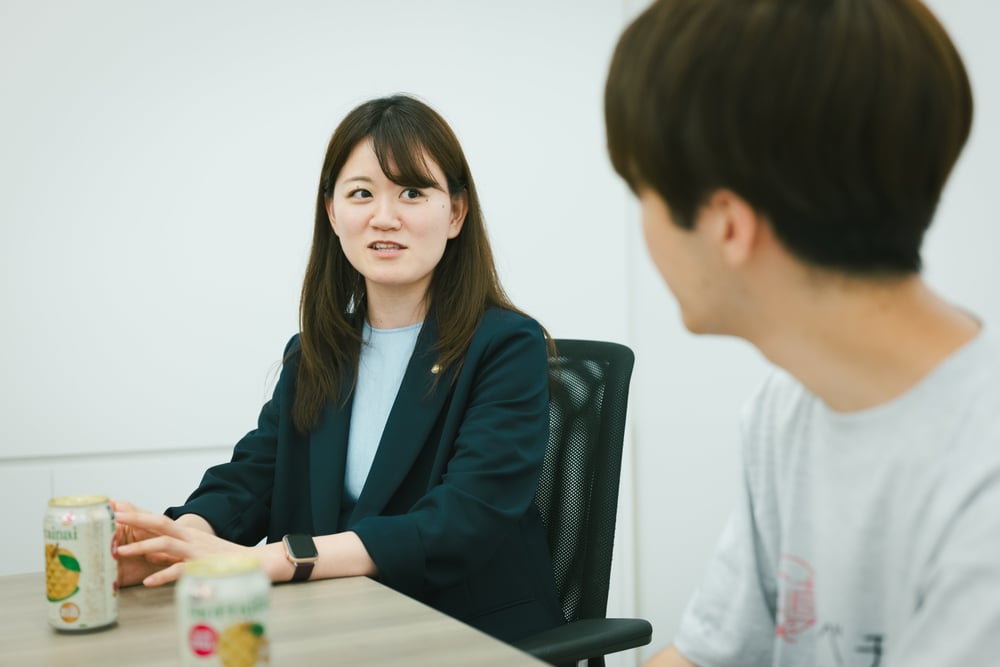
Tokairin: Such an attitude also motivates us. While the price is slightly higher than that of conventional products, the difference contributes to social good. Customers' understanding will significantly improve by more social contribution Kirin makes through nationwide distribution network.
Matsuura: The strength of a major beverage manufacturer lies in its numerous points of connection with customers. That is why I believe it would be ideal for companies and governments with the same vision to collaborate actively, regardless of their size. At Vivid Garden, we are promoting the Tabe Choku Primary Industry SDGs Project to reduce food loss, and this project is being carried out in collaboration with several companies with the same vision.
To build a win-win relationship among producers, customers, and companies while reducing food waste, the efforts of a single company are insufficient. A business model that prioritizes the interests of one's own company or suppliers is simply inadequate. We feel that a structural change near societal transformation is necessary. Without the boldness to collaborate even with competing companies, these issues cannot be resolved.
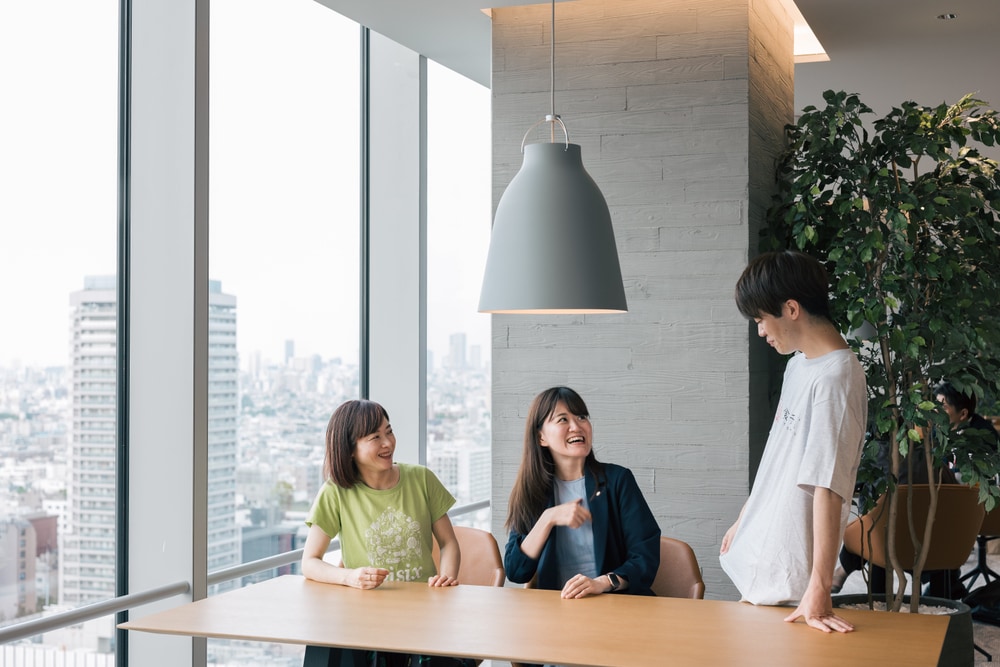
Yamaoka: That's right. Of course, collaboration between farmers and producers is important, but when companies collaborate, we can have a greater impact on society and take a significant step toward solving problems.
When we think about what we, as a company, can do, we believe that continuity is just as important as collaboration. We are continuing the Hyoketsu® Mottainai Project, and the second phase is now underway. Ultimately, we aim to reduce fruit food waste by 150 tons annually by 2027.
Following the launch of the first phase, we have received feedback from JA organizations across the country saying, “We have this specialty product.” Today, we learned a lot from Mr. Matsuura and Mr. Tokairin's discussion.
Through today's discussion, I felt that in order to create collective impact*4 as a company, it is important to collaborate with other organizations and companies not only through our business initiatives but also through initiatives for society as a whole. Thank you very much. With this knowledge as a driving force, we will continue to develop this initiative. As companies with similar goals, we look forward to working with you in the future.
*4: Results achieved when companies, NPOs, local governments, and other organizations work collectively to solve social issues.
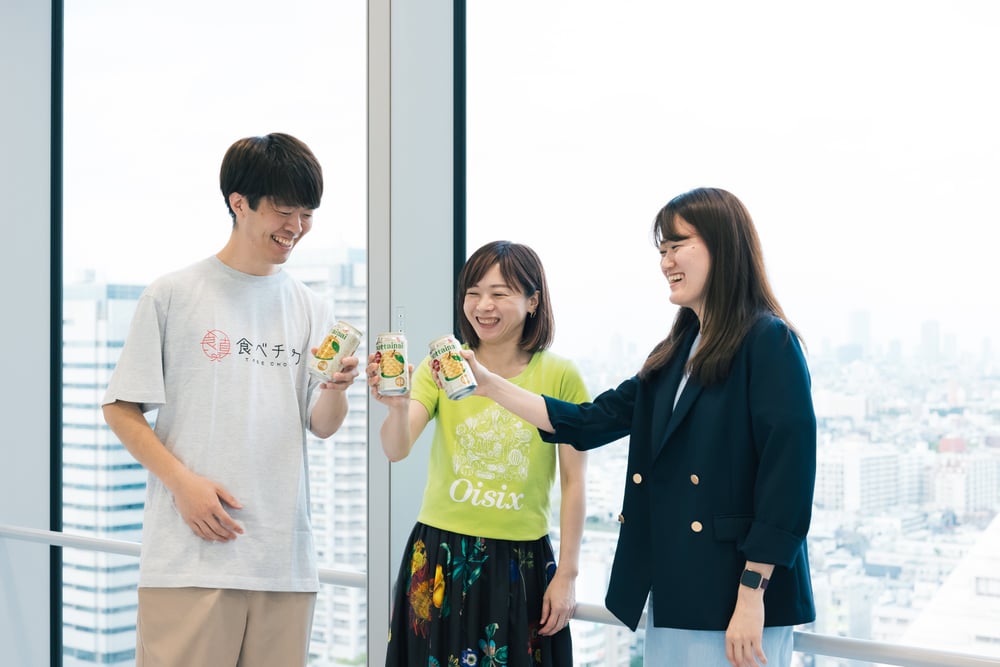
Yusuke Matsuura
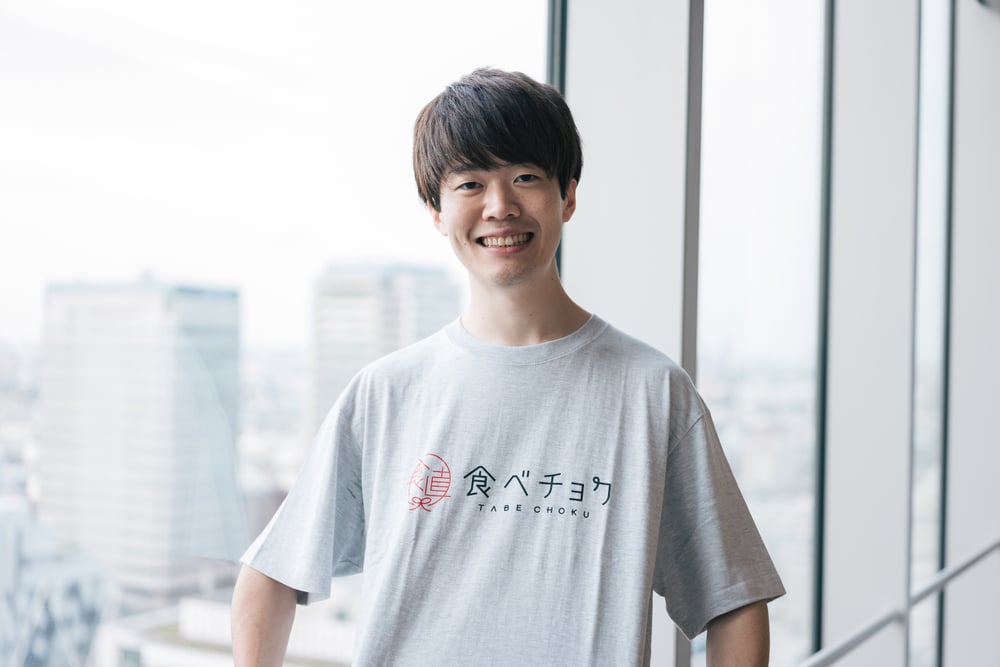
Executive Officer, Vivid Garden Co., Ltd. Graduated from Hitotsubashi University. During his student days, he gained experience at four start-ups, launching e-commerce and media businesses, and learned about marketing. He joined a foreign IT company, and was a first fresh-out-of-college employee to work as the technical trainer. In November 2018, he joined Vivid Garden Co., Ltd., where he served as director and marketing manager. Currently, as an executive officer, he leads the planning and execution of new business strategies.
Yoko Tokairin
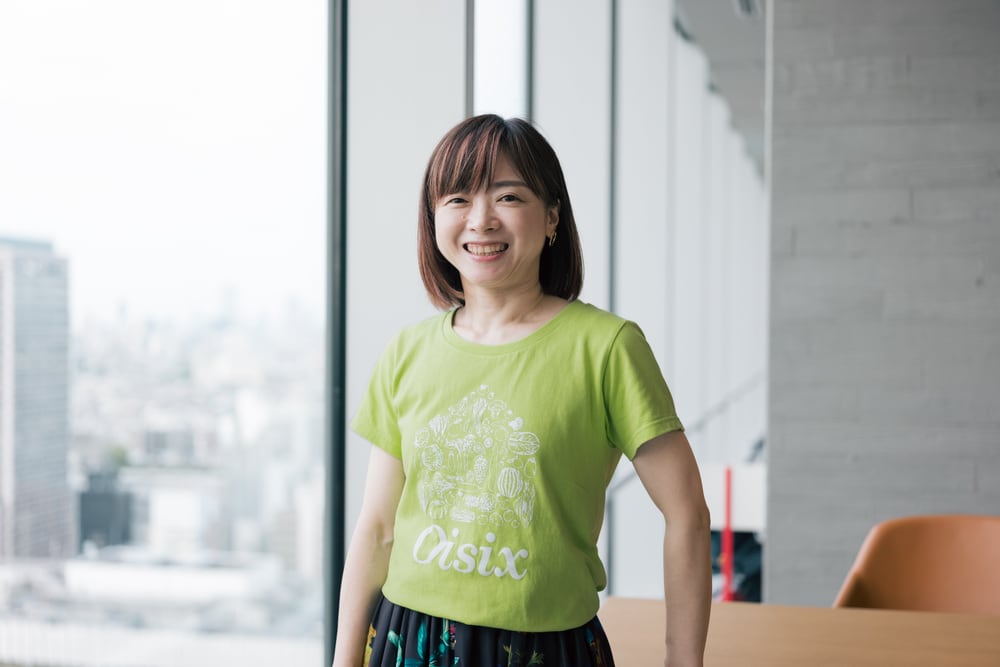
Executive Officer, Oisix Ra Daichi Co., Ltd., Head of Green Strategy Division, Management Planning Department. Joined Radish Boya in 2006 as a merchandiser. After the merger with Oisix Ra Daichi in 2018, she served as Head of the Radish Boya Product Division from 2019, and assumed the Leader of the Green Project in January 2021. In November 2022, she was appointed as a visiting professor at Tohoku University, where she is involved in the Future Medical Innovation Graduate Program.
Kana Yamaoka
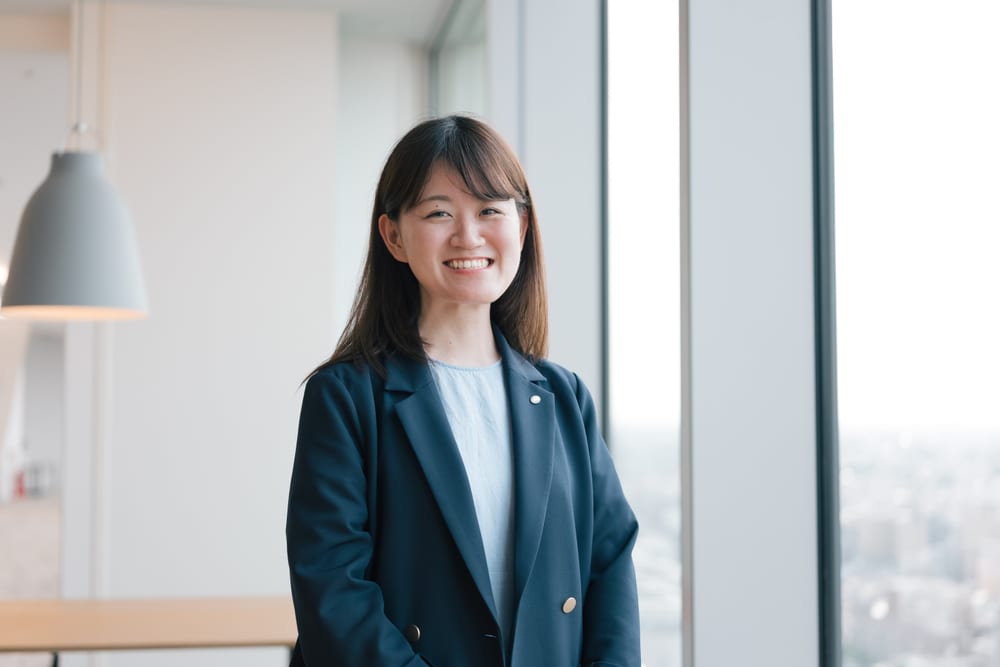
Marketing Department, Brand Manager, Kirin Brewery Company, Limited. Joined the company in 2015. After working in sales, she moved to the Marketing Department of Kirin Beverage in 2019, where she was responsible for the Koiwai brand. She played a central role in the planning and development of Koiwai Pure Water Tohoku Mix, which was launched on the 10th anniversary of the Great East Japan Earthquake. She worked on the Afternoon Tea brand from October 2020. October 2022, she became responsible for Kirin Beer's Hyoketsu® brand and has been involved in developing Hyoketsu® Mottainai.
*Affiliations (contents) are as of the date of publication.